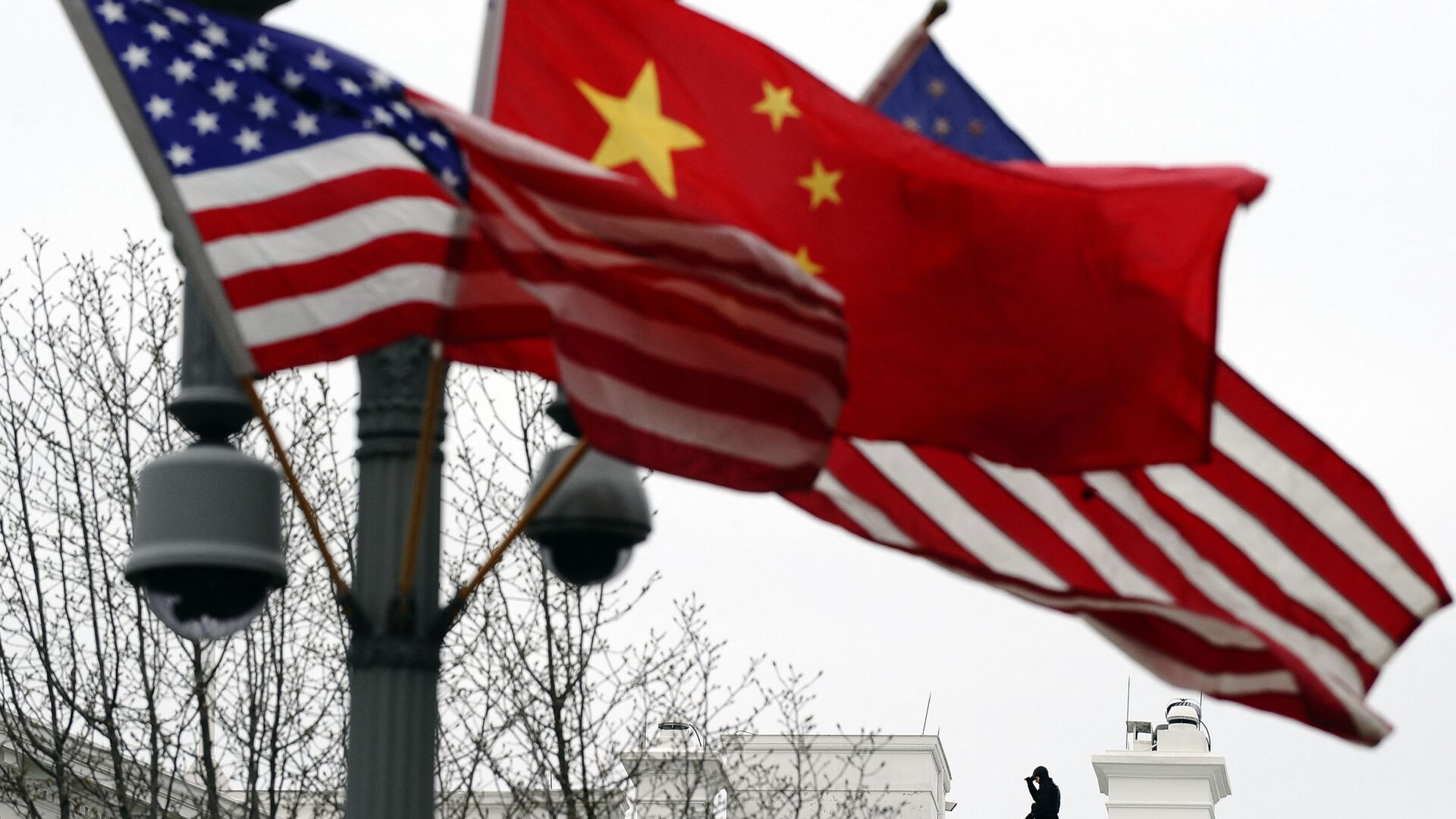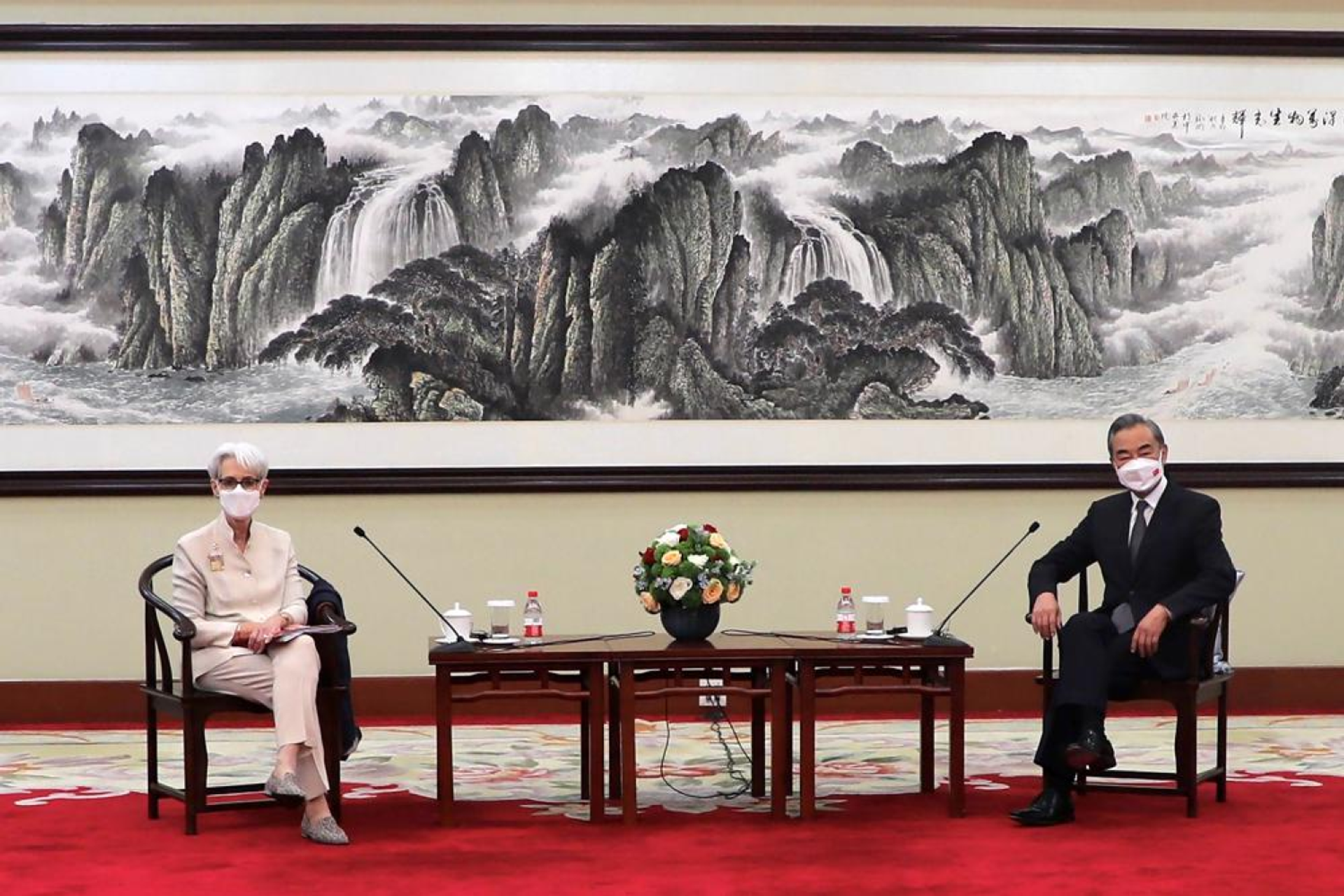‘Imagined Enemy’: Beijing Says US Must Abandon Sanctions, Meng Extradition, to Repair Relationship
21:52 GMT 26.07.2021 (Updated: 11:58 GMT 26.10.2022)

© AFP 2023 / JEWEL SAMAD
Subscribe
In response to US sanctions against Chinese firms and officials, Beijing has begun issuing its own reciprocal measures, including most recently former US Commerce Secretary Wilbur Ross and Sophie Richardson, director of Human Rights Watch's China department, among four others on Saturday.
At a meeting with his US counterpart on Monday, Chinese foreign vice-minister Xie Feng presented the US with two lists: one contained remedial actions Beijing expected from Washington before further meetings would be agreed to, and the other a list of concerns China has about actions and policies in the United States.
US Deputy Secretary of State Wendy Sherman went into Monday’s meetings in Tianjin “to ensure that there are guardrails and parameters in place to responsibly manage the relationship” with China, a senior Biden administration official told Reuters on Saturday.
"She's going to underscore that we do not want that stiff and sustained competition to veer into conflict,” the official said. "Everyone needs to play by the same rules and on a level playing field.”
However, as is often the case in international diplomacy, the two nations clearly have different ideas of what a “level playing field” looks like. That was the message Xie delivered, saying in a statement after his meeting with Sherman that the US-China relationship had reached a “stalemate and faces serious difficulties … because some Americans portray China as an ‘imagined enemy.’”
“It seems as if by making China an ‘imagined enemy’, a national sense of purpose would be reignited in the US,” Xie continued, noting how the US frames its relationship with China with references to major wake-up moments, such as the December 7, 1941, attack on Pearl Harbor naval base by Japan and the October 4, 1957, launching of Sputnik 1, the world’s first artificial satellite, by the USSR.
“The hope may be that by demonizing China, the US could somehow shift domestic public discontent over political, economic and social issues and blame China for its own structural problems,” Xie said. “It seems that a whole-of-government and whole-of-society campaign is being waged to bring China down. It is as if when China's development is contained, all US domestic and external challenges would go away, and America would become great again and Pax Americana would continue to go on.
“The US keeps making an issue with China. It's as if the US side has nothing to talk about except about China. We urge the United States to change its highly misguided mindset and dangerous policy,” he said.
According to the South China Morning Post, the two lists Xie gave Sherman included the following items:
Remedial Demands:
- Remove visa restrictions on Communist Party of China members, their families, and Chinese students
Remove sanctions against Chinese leaders, government officials and state agencies - End restrictions on Confucius Institutes and Chinese companies in the US
- Stop listing Chinese media as foreign agents
- Stop seeking extradition of Huawei CFO Meng Wanzhou from Canada
Grievances:
- Unfair treatment of Chinese citizens in the US
- Harassment of China’s US embassy and consulates
- Rise in violent attacks against Chinese and Chinese-Americans in the US
Last week, the US and its allies, including NATO members, Australia, New Zealand, and Japan, released a statement “exposing further details of the PRC’s pattern of malicious cyber activity,” blaming China for a number of cyber attacks, such as hacking the Microsoft Exchange Server and various “ransomware attacks, cyber enabled extortion, crypto-jacking, and rank theft.”
However, US accusations of malign activities by China are wide-ranging, from territorial claims in the South China Sea to the national security law in Hong Kong, China’s policy regarding Taiwan as a rebellious province of the country, and anti-extremist programs in Xinjiang the US claims amount to “genocide” against the Muslim Uyghur population.
Sherman also met with Chinese Foreign Minister Wang Yi on Monday. According to US State Department spokesperson Ned Price, they had a “frank and open discussion” about “ways to set terms for responsible management of the US-China relationship.”
“The relationship between the United States and the PRC is a complex one, and our policy is very complex as a result,” Sherman told The New York Times after the meetings. “We believe our relationship can tolerate that nuance.”
“We were quite direct with each other on the areas of great difference,” she said of her meeting with Wang. “On areas where we have common interests and there are great global interests, we had very substantive discussions, shared some ideas. We will have to see where that goes.”

In this photo provided by the U.S. Department of State, U.S. Deputy Secretary of State Wendy Sherman, left, and Chinese Foreign Minister Wang Yi sit together in Tianjin, China, Monday, July 26, 2021.
© AP Photo / US State Department
Prior to their meeting, Wang said on Saturday that China would have to give the US a “tutorial” on how to treat other countries as equals.
“The United States always wants to exert pressure on other countries by virtue of its own strength, thinking that it is superior to others,” Wang said, referring to Price’s comments last week that Sherman was going into the summit from a position of strength after meetings with US regional allies.
“However, I would like to tell the US side clearly that there has never been a country in this world that is superior to others, nor should there be, and China will not accept any country claiming to be superior to others,” Wang added, according to SCMP. “If the United States has not learned how to get along with other countries on an equal footing by now, then it is our responsibility, together with the international community, to give the US a good tutorial in this regard.”
His comments echo those by Yang Jiechi, director of the CPC’s Central Foreign Affairs Commission and leading diplomat at the 2+2 talks in Anchorage, Alaska, in March, who at the time told US Secretary of State Antony Blinken that the US was not qualified to speak from a position of strength when criticizing China.



